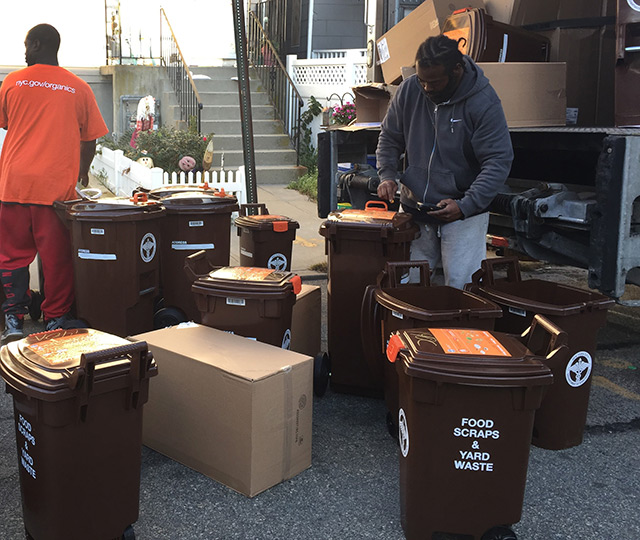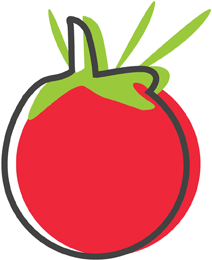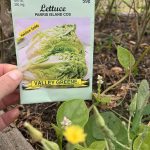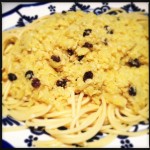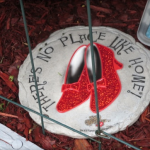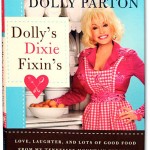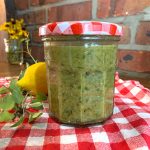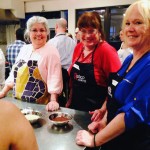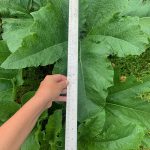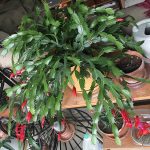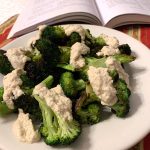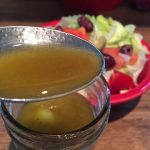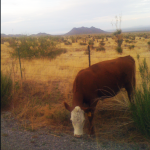I’m pledging #zerowaste
I was working on a menu design in my home office when I heard a truck pull up outside. Being nosey and easily distracted, I peeked out the window. It was a white truck and behind it was a sanitation car. The back gate of the trailer rolled up and two men started unpackaging dozens of brown bins. Finally, our composting starter kits were here!! I grabbed my phone and ran outside, immediately instagramming a picture, tagging @nycsanitation.
I’ve been eager to participate in the NYC Organics Program. The purpose of the #zerowaste project is to reduce waste in our landfills while creating clean energy and compost for our gardens and city parks. Think of all those delicious tomatoes! According to the NYC Department of Sanations almost 31% of the waste collected in the city is organic.
Under the Bloomberg administration, DSNY began offering curbside collection of organic waste in 2012. By 2018 every resident, school and institution in NYC will have the opportunity to participate in the program. I remember seeing the brown bins in Park Slope about a year ago and I was envious. Yes, I envied them because of their garbage cans! “When will Rockaway get them?” I thought. A few months ago I learned Queens Community Board 14 (that’s us) was slated to receive composting bins in October! Since the announcement, there’s been a lot of chatter and questions regarding the program in my twitter feed – Can we compost meat? Do we need special garbage bags? Will this cost us money? When do we put out the brown bin?
The information package inside your composting starter kit will answer all of these question but I will address them here too. We can put any food scraps in our bins including meat and dairy*. Not so obvious items to compost – coffee grinds, egg shells, cooked pasta, tea bags, wine corks (I’ll have plenty of those) and stale bread or cereal. Food-soiled paper like napkins, paper towels, paper plates, coffee filters and cupcake holders go in your bin too. Leaves and other yard waste can be added to your brown bin outside. You don’t need to bag it up but if you choose to use one (probably less messy), it should be a brown bag or a certified compostable bag. I purchased compostable bags on amazon, 100 for 12 bucks. If you’re worried about fruit flies or odor you can freeze your organic waste until collection day. Once you’ve filled up inside, transfer your bags or kitchen container outside placing the material in the large brown bin. The collections will be once a week on the same day as your recycling day.
This past weekend I ran into my friend Reece Pacheco, columnist of Surf Bananas, conservationist and all-around cool surfer guy. We started talking about the organics program. I was confused about one thing. Organic waste is biodegradable, so why is it harmful in a landfill? Reece explained that landfills produce around 36% of all methane em
I felt a little silly that I was unaware of what Reece had explained so I started reading all about greenhouse gas and about waste in NYC.
On nycgrow.org I found some eye opening facts:
New York City produces 12,000 tons of waste every day. Residents currently recycle only about 17% of their total waste – half of what could be recycled under the current program.
The United States produces 33% of the world’s solid waste, with 4.6% of the global population.
Exporting our garbage to other states like Pennsylvania, Ohio and Virginia cost New York City taxpayers $290 million in 2007. This does not include the cost of collection.
Diesel trucks carry Manhattan’s garbage 7.8 million miles every year. That’s the equivalent of driving more than 312 times around the earth.
Using recycled materials to make new products saves energy and other resources, reduces greenhouse gases and industrial pollution, and curbs deforestation and damage to ecosystems.
Participation in the organics collection program is voluntary, meaning you won’t be fined if you don’t participate. But please consider pledging to protect our planet by taking part and reducing your personal footprint. It’s a big difference we can all make will little effort day-to-day on a micro level.
*If you’re composting in your backyard don’t include meat or dairy.
